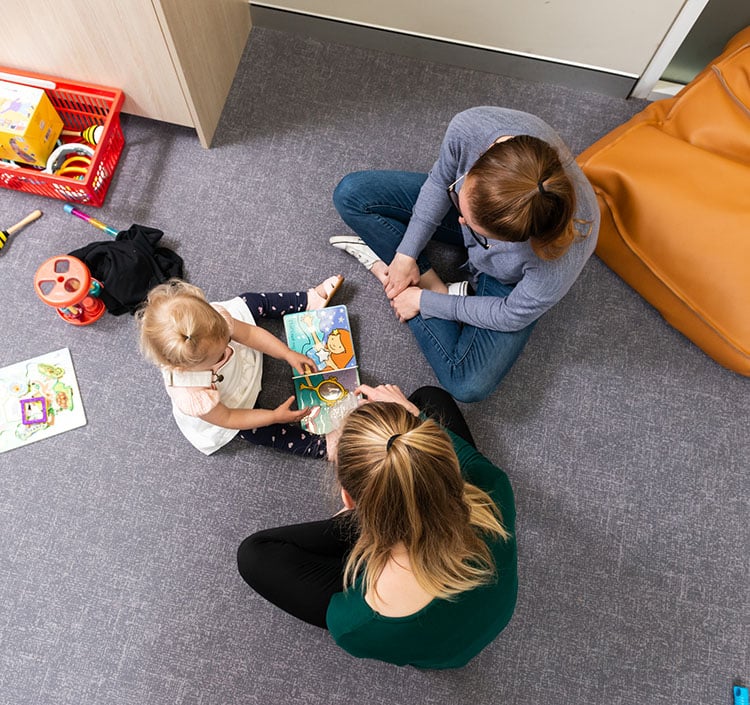Search
Research
Exploring the Experiences of Australian Fathers Who Lead School ‘Dads Groups’Past research suggests that fathers are underrepresented in traditional parenting and child health promotion programs compared to mothers. One promising method to deliver support is a peer-facilitated approach that enables fathers to connect with their peers. This model has been adopted by several community organisations in Australia. However, limited research evaluates the implementation and impact of these services.
Research
Azithromycin mitigates human rhinovirus impact on barrier integrity and function in non-diseased airway epitheliumAzithromycin improves symptomology in various chronic airway diseases exacerbated by viral infections. However, the mechanisms underlying the apparent antiviral effects of azithromycin remain unclear.
Research
Does exercise in cool water cause a higher risk of hypoglycaemia than in thermoneutral conditions in type 1 diabetes?The aim of this study was to test the hypothesis that exercise in cool water results in a greater decrease in blood glucose concentration than in thermoneutral water or on land in individuals with type 1 diabetes.
Research
Care provided to women during and after a pregnancy complicated by hyperglycaemia: the impacts of a multi-component health systems interventionAboriginal and Torres Strait Islander women experience a disproportionate burden of hyperglycaemia in pregnancy. A multi-component health systems intervention aiming to improve antenatal and postpartum care was implemented across Australia’s Northern Territory (NT) and Far North Queensland (FNQ) between 2016 and 2019. Components included clinician education, improving recall systems, enhancing policies and guidelines, and embedding Diabetes in Pregnancy (DIP) Clinical Registers in systems of care. This program was evaluated to determine impacts on clinical practice and maternal health.
Research
Nationwide spatial dynamics of taeniasis in Thailand: declining prevalence but shifting focus and One Health risk factors across 2008–2014The prevalence of taeniasis in Thailand has decreased over the past six decades. However, it remains a public health concern, particularly in focal areas, especially along the border regions where migration between Thailand and neighboring endemic countries is frequent. Spatial distribution analysis provides a useful method for identifying high-risk areas and implementing targeted integrated control measures. This study aimed to examine the spatial patterns of taeniasis in 2008 and 2014, along with their associated One Health risk factors at the sub-district level.
Research
Extreme drought and sexual violence against adolescent girls and young women: A multi-country population-based studyDroughts have profound and far-reaching impacts on human health and well-being, but their influence on sexual violence among adolescent girls in low- and middle-income countries (LMICs) is underexamined.This study examines the association between drought and sexual violence against adolescent girls and young women globally, using cross-sectional, nationally representative data from the Violence Against Children and Youth Surveys (VACS) from 2013 and 2019.

News & Events
History of OT in AustraliaIn this blog, Curtin University Occupational Therapy students Julia Walker and Mandy Bull delve into the history of Occupational Therapy in Australia.
Research
Teaching Kitchens: An innovative program for enhancing self-management skills in adolescents living with type 1 diabetes (T1D) – A feasibility studyAdolescents living with type 1 diabetes (T1D) are faced with unique challenges to nutrition management. The current Perth Children's Hospital (PCH) T1D management model includes individualised education at diagnosis and annual reviews. Currently, no group education is provided to develop self-management skills for healthy meal preparation. Teaching Kitchens offers a skills-based program in food literacy and nutrition. This feasibility study explored if a Teaching Kitchens program at PCH engaged adolescents aged between 13 and 17 years, living with T1D.
Research
Psychological and self care outcomes for children and adolescents living with type 1 diabetes and their caregivers attending diabetes camp: A mixed methods studyDiabetes camps for children and adolescents living with Type 1 Diabetes (T1D) offer an important opportunity to foster self-efficacy and 'common humanity', a sense that they are not alone in their challenges. The current study primarily aimed to assess whether psychological wellbeing, diabetes self care behaviours and HbA1c improved amongst campers and their caregivers, and whether these would be sustained at 3- and 6-months.
Research
Local therapy with combination TLR agonists stimulates systemic anti-tumor immunity and sensitizes tumors to immune checkpoint blockadeW. Joost Ben Lizeth Rachael Tao Omar Lesterhuis Wylie Orozco Morales Zemek Wang Elaskalani BSc PhD BSc, MSc, PhD BSc (Hons), PhD PhD BSc, MSc, PhD

News & Events
ABC Radio Perth DRIVE interview with Andrew WhitehouseProfessor Andrew Whitehouse recently spoke with ABC Perth’s Geoff Hutchison and Andrea Burns, Postgraduate Broadcasting Academic at ECU, for their ‘What Just Happened?’ segment which involves sitting down with a prominent Perth figure to get a sense of their life story and what matters most to them.
Research
Novel approaches to measuring cognition in individuals with severe to profound functional impairment: A pilot study in SCN2A-related disorderValid clinical outcome assessments with the ability to capture meaningful aspects of neurodevelopment for individuals with neurogenetic conditions associated with profound functional impairments are lacking, yet critical for clinical care and clinical trial readiness.

Get involved in a real-life research project
Neurodiversity refers to the different ways that people experience and interact with the world around them. Each person’s brain works differently, meaning no two brains are the same.
Research
Clinical outcomes and severity of laboratory-confirmed RSV compared with influenza, parainfluenza and human metapneumovirus in Australian children attending secondary careAcute lower respiratory infections (ALRIs) are a major contributor to the global infectious disease burden and a common cause of hospitalisation for children under 2 years. We compared clinical severity in children hospitalised with respiratory syncytial virus (RSV), parainfluenza virus (PIV), human metapneumovirus (hMPV) and influenza virus (IFV).
Research
KMT2A-rearranged acute lymphoblastic leukaemiaKMT2A-rearranged acute lymphoblastic leukaemia (ALL) represents a high risk subtype of childhood ALL. Historical treatment strategies have comprised of intensification with conventional chemotherapy. However, outcomes have remained consistently poor compared to the advances that have been seen for other ALL subtypes, particularly for infants diagnosed before their first birthday
Research
Patient-related factors impact the implementation of inpatient antibiotic allergy delabelingThe clinical consequences of an antibiotic allergy label are detrimental, impacting health care delivery and patient outcomes. We assessed hospital inpatients with intent to offer free antibiotic allergy labeling assessment within a randomized controlled trial. We sought to determine the feasibility of establishing an adult antibiotic allergy delabeling service in a Western Australian tertiary public hospital.
Research
Jet versus vibrating mesh nebulizer for tobramycin aerosol in spontaneously breathing children with tracheostomies: A simulation studyTracheostomy tubes act as foreign bodies, predisposing the surrounding airway to respiratory infections. Initial treatment for infections is topical - nebulized tobramycin - although guidelines for standardized treatment are lacking.
Research
Pooled Analysis of Physical Activity, Sedentary Behavior, and Sleep among Children from 33 CountriesThe prevalence estimates of physical activity, sedentary behavior, and sleep (collectively known as movement behaviors) in 3- and 4-year-old children worldwide remains uncertain.
